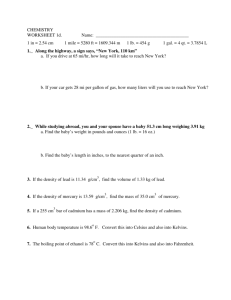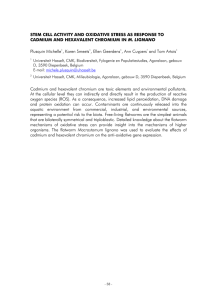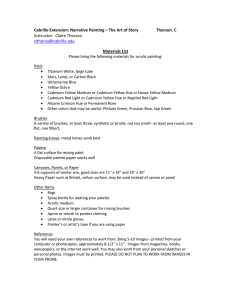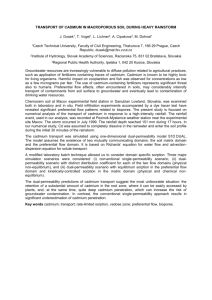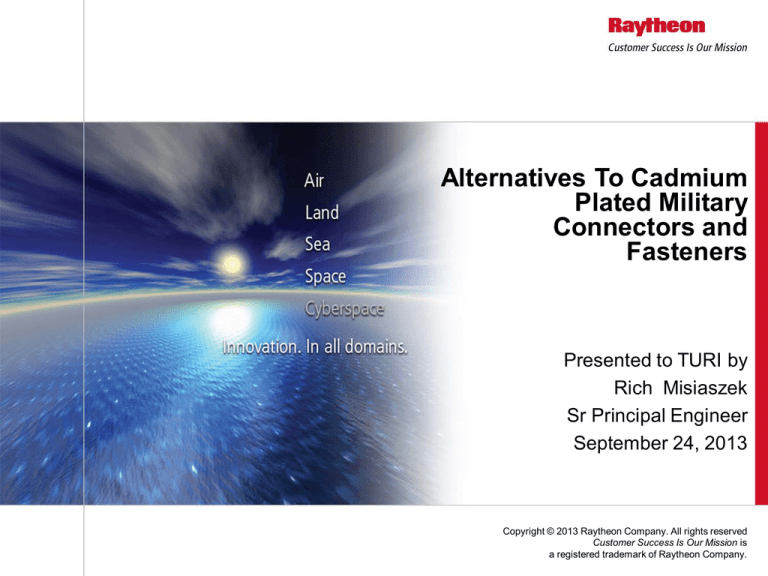
Alternatives To Cadmium
Plated Military
Connectors and
Fasteners
Presented to TURI by
Rich Misiaszek
Sr Principal Engineer
September 24, 2013
Copyright © 2013 Raytheon Company. All rights reserved
Customer Success Is Our Mission is
a registered trademark of Raytheon Company.
Outline
Undesirable Properties of Cadmium
Desirable Properties of a Cadmium Plated Finish
Industry Standard Connector Specifications
– Cylindrical and Rectangular
– Fastener specs
Alternate Finish Reports and Industry Test Data
Regulatory Agency Restriction of Cadmium
Recommendations
9/23/2013
2
Undesirable Properties Of Cadmium
Cadmium is a Known Carcinogen
– Inhalation of airborne cadmium dust particles is extremely hazardous
– OSHA Personal Exposure Limit (PEL) of PEL of 5 micrograms/cubic meter in an 8
hour day
CA has even more stringent regulations (.005).
Higher PELs allowed for metal finishers, Ni-Cd battery mfgrs & Cd refining
operations
Highly Regulated domestically and Internationally
– Listed as a substance of very high concern (SVHC) by the EU REACH regulation
– Additionally on NAS 411, NAVY PCCL, NAVAIR Chemicals of Concern, EPA 17,
RoHS, etc
Subject to Cadmium Bloom – highly toxic white corrosion product
– Produced when cadmium is exposed to organic acids in an enclosed environment
– shipping/storage containers. Avoid wood pallets which emit formic acid
9/23/2013
3
Undesirable Properties Of Cadmium
Subject to the spontaneous growth of Cadmium whiskers
Sublimates in vacuum environments – prohibited in space
applications
Galvanically incompatible with Carbon Filled Composites
Requires hydrogen bake out if plated on high strength steels
to avoid hydrogen embrittlement metal fatigue/failure
Poor Corrosion Resistance in Highly Acidic Environments
9/23/2013
4
Desirable Properties Of Cadmium
Sacrificial plating with good corrosion resistance (500-1000 hrs min
neutral salt spray)
Conductivity for EMI shielding, grounding, electrical bonding and lightning
strike (2.5 milliohms max shell to shell resistance)
Meets thermal shock, vibration, shock, humidity, EMI shielding, bending
moment and other connector performance requirements
Electroplated finish relatively thin (200-800 microinches)
– On fine and coarse threads and complex geometries required for connectors and fasteners
– Nickel under plate is typically used to increase wear and corrosion resistance
– Industry electroplating specs are SAE AMS-QQ-P-416, NAS4160 and MIL-STD-870. See notes for
application guidance
Good thread lubricity (500 mating cycles min), non galling
Predictable torque/tension on threaded fasteners, no thread lube required
9/23/2013
5
Desirable Properties Of Cadmium
Can meet coupling and uncoupling torque requirements after exposure to
severe corrosion environments
Galvanically compatibility with several other commonly used items
–
–
–
–
–
Cable shield materials (tin, silver and nickel)
Stainless steel coupling nut retaining rings
EMI spring fingers
EMI shielding gaskets
Aluminum mounting panels
Non reflective finish preferable for military applications
Finish can be marked with color bands for full mate indicator required on
connectors, military P/N and date code, supplier mark
– Resistance to solvents (oil, greases, fuels, aircraft de-icers, cleaners)
– Marking remains permanent after normal use and exposure to solvents
Finish provides good adhesive properties for paint, marking, and
adhesives used to bond plastic inserts and silicone grommets used in
9/23/2013
connectors
6
Cadmium Connector Specifications
DLA and SAE have changed nearly every connector specification and
slash sheet to add alternate finishes to cadmium:
MIL-DTL-38999 and associated slash sheets and MS sheets
MIL-PRF-28840 and associated slash sheets
MIL-DTL-26482 and associated MS sheets
MIL-DTL-83723 and associated slash sheets
MIL-DTL-22992 and associated MS sheets
MIL-PRF-83513 and associated slash sheets
MIL-PRF-24308 and associated slash sheets
MIL-DTL-83733 and associated slash sheets
MIL-PRF-28876
MIL-PRF-83513
SAE AS85049 and over 100 slash sheets
SAE AS50151. AS3400 and AS3450 sheets pending update.
Problem. Not all connector specs have qualified sources available.
Check the spec and the QPL or QPD prior to assuming availability
Connector Manufacturer’s are required to qualify alternate finishes
9/23/2013
7
SAE AE8-C1 Connector Committee
Recommended Alternate Finishes
3 alternate military/aerospace grade connector finishes may be considered for
replacement of cadmium plating on aluminum, stainless steel and composite
connector bodies:
Nickel-Fluorocarbon (PTFE) - SAE AMS-2454
Zinc-Nickel (5-20% nickel) - ASTM B841, AMS2417
Pure Dense Aluminum - Mil-DTL-83488
Connector suppliers use these 3 plating specs as a baseline. Each has their own
recipe for thickness, underplate(s) to meet the performance required for connectors
Zinc-Nickel and Aluminum connector finishes currently contain a hexavalent chromate
seal – another known carcinogen
– Non hex chrome seals are available but cannot currently meet mil spec performance
Nickel-Fluorocarbon requires no supplementary chromate seal
All 3 finishes are electrically conductive
9/23/2013
8
SAE AIR5919A Alternate Connector Finishes
report
AIR5919 report was updated in July 2010
Provides an alternate finish test data summary from 7 suppliers
Suppliers tested their alternate finishes on connectors and accessories
– Some alt finishes were mated to cadmium plated aluminum for galvanic
compatibility after environmental testing for neutral (500-1000 hrs) and acidic
(SO2, 336 hrs) salt spray corrosion tests after 500 mating cycles.
– Shell to shell conductivity and coupling torque performance was also measured
before and after environmental testing
9/23/2013
9
Alternative Connector Finishes
38999 series III, class L, nickel plated stainless steel
– Alternate finish option recently qualified by Amphenol
– A weight, availability and cost penalty for using stainless steel connectors
– Meets 500 hour salt spray, conductive finish
Composite 38999 connectors (class J and M)
– Available as an alternative to aluminum bodies
– Available with nickel plating - good for severe corrosion applications which
have a 2000 hour salt spray test rating
Compared to class W cadmium on aluminum at 500 hrs min.
– Composites with aluminum, zinc-nickel and nickel-PTFE also available with
finishes that meet 500 hrs min salt spray
9/23/2013
10
Misc Alternate Finish Reports/Papers
Strategic Environmental Research and Development Program (SERDP), Surface
Engineering Database - ASETS Defense http://www.asetsdefense.org/databasedescription.aspx
Advanced Materials, Manufacturing, and Testing Information Analysis center (AMMTIAC)
http://ammtiac.alionscience.com/
The Nuts & Bolts of Cadmium Plating Alternatives
Automotive Finishing Online http://www.afonline.com/articles/99sp01.html
Joint Strike Fighter report by Navair and Lockheed Martin
Saab Bofors Dynamics report
NDCEE/TARDEC report
Amphenol Aerospace Operations report, SAE AEISS 2005
Cadmium alternative papers http://www.rowantechnology.com/technical-resources/paperspresentations/.
http://www.asetsdefense.org/Plating-Alternatives-2011.aspx
REACH information http://echa.europa.eu/web/guest/regulations/reach/legislation
Testing Cadmium Alternatives for High Strength Steel Phase II Joint Test Report
http://www.alumiplate.com/wp-content/uploads/ST024-Testing-Cd-Alts-Phase-II-Joint-Test-Report.pdf
9/23/2013
11
Fastener Spec Examples
MS90353 Rivet (Aluminum alternative)
NAS18.2.1 Hex head bolt (Zinc alternative)
NAS1352 Socket head cap screw (no alts)
NAS1580 Bolt, shear (no alts)
NAS1130 helical insert (no alts)
NAS4452 Pin (no alts)
Alternate finishes are not readily available from fastener suppliers
Therefore, it may be necessary to:
– Purchase Cadmium Plated Parts
– Strip the Cadmium Finish
– Re-plate using Alternative Finish
Bake out may be required to avoid hydrogen embrittlement
9/23/2013
12
Alternative Fastener Finishes
Dip Spin metal loaded organic and inorganic based (may not be suitable
for grounding applications)
LHE Alkaline Zinc Nickel with dry film lube
Aluminum, Electroplated with dry film lube
Aluminum, IVD with dry film lube
Hot dip and electroplated Zinc
Alternatives to steel (Titanium, Inconel, Nitronic 60 alloy, stainless A286
alloy)
Nanotechnology finishes?
9/23/2013
13
Regulatory Agency Restriction Of Cadmium
Recent pressure from domestic and international US DoD (DFAR), US Dept of Labor,
EPA, RoHS and REACH policies that restricts, control permissive exposure limits or
bans the use of cadmium
Restrictions are exempted by REACH in Annex XVII for cadmium for certain
aeronautical, aerospace, mining, offshore and nuclear sector applications and for
electrical contacts containing cadmium in any sector of use, on account of the
reliability required of the apparatus on which they are installed.
RoHS exempts Cadmium, Lead, Mercury, Hexavalent chrome from restrictions in
military, space, active medical implant devices and other tools, machinery and
equipment
For many of these regulations, cadmium and hexavalent chromium, there must be
less than 0.01% and 0.1% respectively of the substance by weight at the
homogeneous materials level
Cadmium is typically coated with a hexavalent chromate finish which is also a
hazardous carcinogen
Chemical conversion coatings and passivations containing hexavalent chrome are
currently exempted by DFARS Part 223 and RoHS
9/23/2013
14
Recommendations For Further Studies
Galvanic Compatibility
–
–
–
–
All alternative connector finishes must be compatible with the cable assembly system
Insure full compatibility with cable shield materials, accessories and mounting panels
More field data and galvanic testing is required to build confidence in the alt finishes
Connector finishes are in direct contact with tin, silver, nickel, stainless steel retaining rings, aluminum
panels and various EMI shielding gasket materials (monel mesh, metal particle filled elastomers)
– SAE AIR4789 and AIR5919 are suggested for test plans and inspection criteria for connectors
Define Galvanic data (EMF) for Electroless Nickel-PTFE
– Need to understand why it performs better than Electroless Nickel in corrosion resistance
Fastener Finishes Must Be….
–
–
–
–
–
–
Corrosion Resistant
Galvanically Compatible with Aluminum and Steel Mounting Panels/Hardware
Non-Galling with Low Coefficient of Friction
Durable
Economical,
Predictable torque/tension performance
Preferably similar to cadmium to avoid changing recommended torques creating a field service
issue
Fastener industry needs to revise specs to add alternate finishes
Nanotechnology Finishes for Metals
9/23/2013
15
Backup
9/23/2013
16
Chromate Finish
Hexavalent chrome, a known carcinogen, was targeted by DOD for
prohibition on new system designs. DFARS Case 2009-D004 document
was signed into law in May 2011. DFARS part #253.223-7008 later
released to clarify exemptions. Chemical film finishes were not
prohibited due to lack of available drop in replacements, but this will
change as alternatives become available
Hex Chrome has a PEL of 5 micrograms/cubic meter in an 8 hour day per
OSHA
Trivalent chrome and other non-chrome alternatives are available for
some paint primers and paint applications but they are not drop in
replacements for hex chrome based materials
Color options very limited for non hex chrome alternates. Yellow and
Olive drab color is not available. Trivalent chromates colors are at
present only available in tan or blue-ish . Marking permanency on non
hex chrome alternates is unknown. The mil spec connector marking is
required to meet a resistance to solvents qualification test which is harsh
on marking
9/23/2013
17

